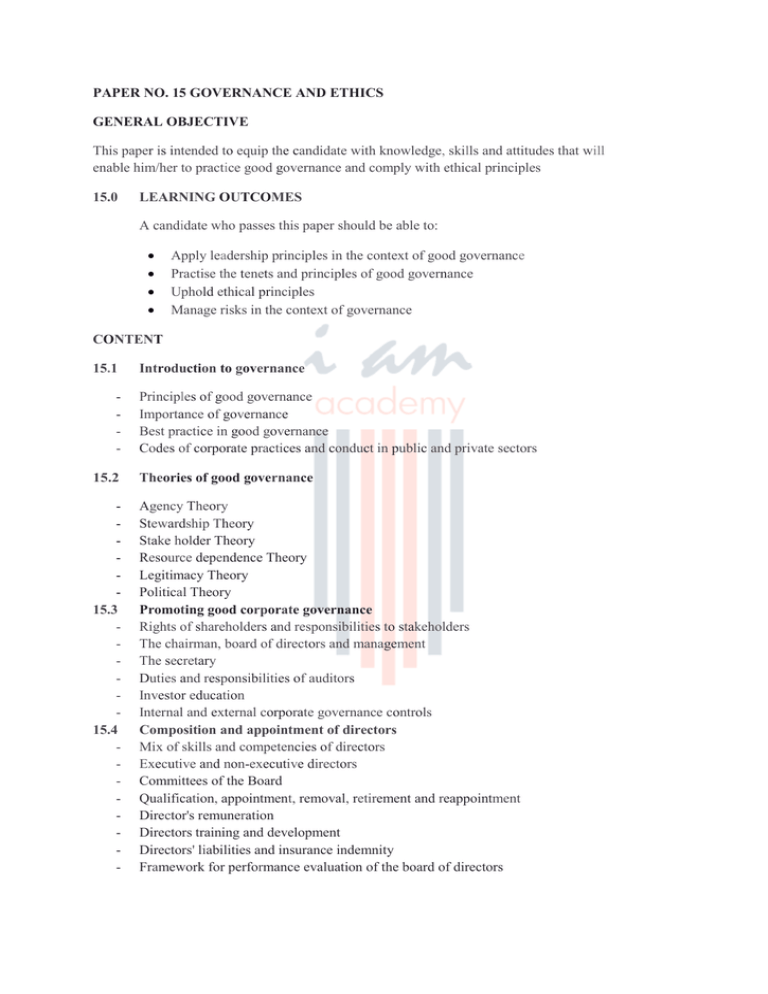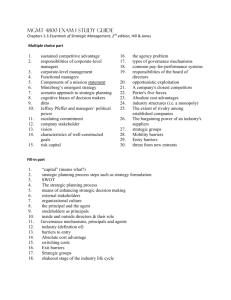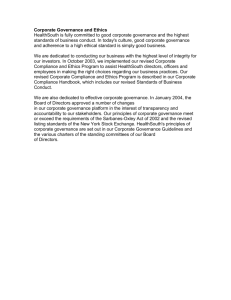Paper 15 Governance and Ethics
advertisement

PAPER NO. 15 GOVERNANCE AND ETHICS GENERAL OBJECTIVE This paper is intended to equip the candidate with knowledge, skills and attitudes that will enable him/her to practice good governance and comply with ethical principles 15.0 LEARNING OUTCOMES A candidate who passes this paper should be able to: Apply leadership principles in the context of good governance Practise the tenets and principles of good governance Uphold ethical principles Manage risks in the context of governance CONTENT 15.1 - Introduction to governance Principles of good governance Importance of governance Best practice in good governance Codes of corporate practices and conduct in public and private sectors 15.2 Theories of good governance 15.3 15.4 - Agency Theory Stewardship Theory Stake holder Theory Resource dependence Theory Legitimacy Theory Political Theory Promoting good corporate governance Rights of shareholders and responsibilities to stakeholders The chairman, board of directors and management The secretary Duties and responsibilities of auditors Investor education Internal and external corporate governance controls Composition and appointment of directors Mix of skills and competencies of directors Executive and non-executive directors Committees of the Board Qualification, appointment, removal, retirement and reappointment Director's remuneration Directors training and development Directors' liabilities and insurance indemnity Framework for performance evaluation of the board of directors 15.5 15.6 15.7 15.8 15.9 - Duties and responsibilities of directors Statutory and fiduciary duties Directors as agents of shareholders Roles of independent director in enhancing good corporate governance Conflict of interest and disclosure Code of good boardroom practice Reserved matters: for the board and shareholders Enterprise risk management Identification of business risks and threats Importance of enterprise risk management Strategies of managing business risks. Establishment and role of the risk management committee Objective and components of enterprise risk management Board's role in enterprise risk management Best practice in risk management Corporate social responsibility (CSR) Overview of corporate social responsibility Argument for and against corporate social responsibility Application and benefits of corporate social responsibility Environmental management Ethical issues in corporate social responsibility Model policy on corporate social responsibility Creating and Registering foundations to manage CSR Social audit Professional values and ethical principles Professional judgment Confidentiality Ethics: definition, theories and principles on ethics Ethical norms, morality and values Code of ethics Standards of conduct and personal integrity Ethics in business Management of conflict of interest and insider trading Definition of terms: conflict of interest, insider trading Conflict of interest and market manipulation Disclosure of interest. Communication of the conflict of interest Whistle blowing Conflict of interest register 15.10 - Corporate Governance Reporting and Best Practices in governance Format of the 'Report on Corporate governance' in the Annual Report Suggested list of items to be included in the report on corporate governance in the annual report of companies Board and committee charter Board and committee evaluation Board succession planning Policy and guidelines on payments and gifts 15.11 Case studies in corporate governance 15.12 Emerging issues and trends





